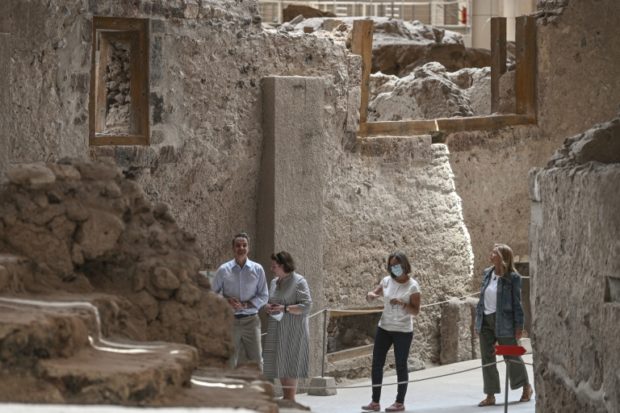Fear and impatience as Santorini awaits return of mass tourism

Greek Prime Minister Kyriakos Mitsotakis (first from L) is guided through the archeological site of the island of Santorini on June 13, 2020. Image: AFP/Aris Messinis
With the first post-lockdown groups of overseas visitors due to return on Monday, the island of Santorini is torn between impatience to get back to business and fear of an upsurge in coronavirus cases.
In the quiet alleys of Fira, the island’s capital, time is passing by to the rhythm of church bells; a reminder of the vanishing hours that separate the town from a flood of tourists.
“We’re desperate for tourists, we need them and we want them. If we don’t have the people, how will we survive?” says Michalis Drosos, who works in a souvenir shop in Fira.
The tourist season officially reopened on Monday in Greece after three months of restrictions that have halted large-scale tourism, a sector that makes up a quarter of Greece’s economic output.
Greek Prime Minister Kyriakos Mitsotakis chose Santorini to inaugurate the season with great pomp on Saturday, inviting tourists to marvel at the “stunning sunset” that has made the island famous.
The Gallini Hotel is expecting a group of Americans via Germany on Monday, but manager George Roussos says he is “never sure” because “something can happen at the last minute.”
Santorini airport will not reopen to international flights until July 1, like all regional airports in Greece. But travelers from around 30 countries will once again be welcomed at the airports of Thessaloniki and Athens, and will be able to travel on to the islands. Hard-hit Britain is not among these countries, for now.
There are nearly 30 international flights landing at Athens International airport Monday, including five from Germany, the country where most of Greece’s tourists traditionally originate from. Two more are landing at Thessaloniki airport.
“It’s better to be here, actually. On the plane there was no (distancing),” Elli, a voyager from Paris, said at Athens airport.
“They tested us, I guess we have to go to a hotel now,” she told AFP.
“People seemed to be wiping things down, we’re just getting used to the new normal,” said Christine Soprano, who flew in from Amsterdam.
There were long queues early Monday at the Greek border with Bulgaria, the only neighboring country approved by Athens for overland travel.
State TV ERT said cars stretched some 15 kilometers (9 miles) from the border crossing of Promachonas.
“We are restarting the country’s most important production engine and we are putting an end to the anguish of 700,000 workers in the tourism sector,” tourism minister Harry Theoharis said in Santorini.
However, some of those 700,000 are still concerned about the coronavirus pandemic, which has so far largely spared Greece with only 183 deaths.
‘On edge’
“Everyone’s scared, maybe we’ll catch the coronavirus,” says Orestis Papoulias, manager of a beach bar on the black sand beach of Perissa.
“As soon as the tourists arrive, we’ll get new cases,” says Canadian Stephane Saat, who has spent 12 years as a tourist guide in Santorini. “If they tell us that there are too many cases, we’ll have to close down again, but what do we do? We don’t have any money left and we’re on edge.”
The procedures for protection against the coronavirus put a heavy burden on hotels, says George Roussos. Each hotel must have a doctor per hotel, a room for possible quarantines and a local hospital capable of carrying out tests.
Restaurateur Evangelos Gidaropoulos is among those who believe Greece’s record of handling the virus, with far fewer cases than other nations in southern Europe, will stand it in good stead.
“I believe generally that people around the world will recognize that and prefer to come to Greece,” he says.
Bearing out his theory, Chinese tourist Max Han reflects that the government has “very good control” over the virus as he wanders the famous blue domes and spectacular cliffs of Oia.
“I feel very, very safe here,” he says. “That is why I chose to travel to Santorini and next week I am going to Crete. No problem for me to worry about the virus.” JB
RELATED STORIES:
From mecca to ghost town, Mykonos awaits tourism relief